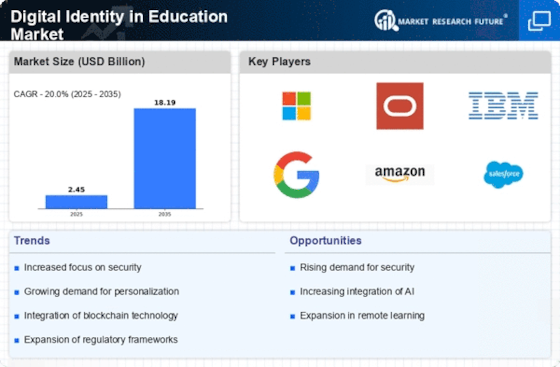Market Analysis
In-depth Analysis of Digital Identity in Education market Industry Landscape
In today's evolving education landscape, market dynamics are affected by Digital Identity. In summary, several market factors contribute to why digital identity is important in educational marketing. First, increased demand for DI results from a growing emphasis on personalized learning experiences. Educational institutions have sought secure digital identities enabling individuals to interact with personalized learning platforms in search of ways through which they can cater to unique learning styles or individualized needs as well as provide secure digital identities needed to access personalized learning platforms and resources, especially with transition into hybrid models of instruction. This situation has increasingly worsened under the hybrid model and online-based instruction methods where students learn through digital platforms requiring uninterrupted access. The second factor is data privacy concerns that have significantly affected schools' approach toward digital identity within the education industry today. With GDPR being implemented worldwide, including COPPA-compliant countries across different levels of governance, educational institutions must take responsibility for their students' identities both online and offline. Aside from this, recent developments regarding ID management stress heavily on data security consent management privacy regulation compliance. Furthermore, global trends in assessment systems also mean that DI will continue playing a significant role in various levels of schooling. Because traditional paper-based credentialing mechanisms are being phased out in favor of digital badges and certificates, there is an increased need for reliable Digital Identity systems. This has not only simplified the credentials process but also necessitated strong identity proof to ease the risk of a fake certification. Furthermore, the Covid-19 pandemic has accelerated the adoption rate of Digital Identity systems within education markets. The shift to remote learning has emphasized the importance of secure digital identities for students, educators, and administrators accessing online learning platforms. Institutions had no choice but to invest in IAM technologies as an urgent response to this sudden change just so that they could continue teaching without worrying about any data breaches. Furthermore, other market factors influencing Digital Identity in Education are the increase in e-learning platforms and tech solutions available today. The success of digital education platforms relies on seamless user authentication processes, as is seen within the EdTech industry. Therefore, there is an increasing trend toward integrating single sign-on (SSO) solutions, biometric authentication, and federated identification management systems in the educational technology landscape.



















Leave a Comment